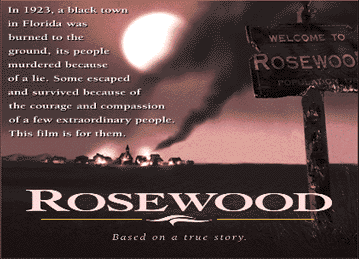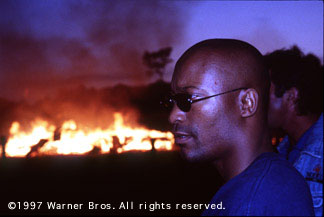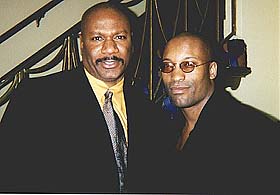| www.johnsingletonfilms.com | THE FILMS OF JOHN SINGLETON |
 |
|
|
In 1923, the predominantly black town of Rosewood, Florida was
burned to ground, its population almost entirely wiped out, by white men
from the neighboring town of Sumner... all because of a lie. This subject
matter provides the basis of director John Singleton's latest film, the
absorbing and potent historical drama Rosewood. The event that triggers the massacre does not come until about a half hour or so in, when one Fannie Taylor (Catherine Kellner), a white housewife, claims that she was assaulted by a black stranger (in actuality, she was assaulted by her lover, who was also white). The exposition that precedes this incident, which establishes everyday life in Rosewood, is slow going; while it can easily be dismissed as a failure on the part of Singleton and screenwriter Gregory Poirer, but it's actually a smart move, for it eventually serves to highlight the human toll of the ensuing massacre and serves as a counterpoint to all the brutality that follows. Poirer's script believably shows how this single claim sets off the whole horrific chain of events, how a search for one man snowballs into an all-out hunt against an entire race. There is also a great understanding of the mob mentality, as we see the town's white sheriff (Michael Rooker) join take part in all the killing even though he's never completely convinced by Fannie's story. Recently another Hollywood studio production, Ghosts of Mississippi, documented an actual historical event and attempted to address its impact on race relations in this country--only to come off as glossy, self-important, uninvolving, and, most of all, synthetic. Rosewood, on the other hand, does feel authentic because it simply doesn't try too hard. Everything on the film is done on a smaller scale--there are no superstars on board to distract from the story, and Singleton, often criticized for being overly preachy (a criticism that is not entirely undeserved), lets the film's message be gleaned from the story itself instead of bludgeoning the audience with it (which he did in his last film, Higher Learning). He also doesn't smooth over the material's rough edges; the killings aren't graphic to the point of being exploitative, but they are graphic enough to convey the sheer brutality and animal nature of the massacre. Similarly subdued to equal effect are the actors. It goes without saying that Ving Rhames, who plays Mann, the noble stranger to town--who, with white shopkeeper John Wright (Jon Voight), helps a number of women and children flee to safety--is a physically commanding presence onscreen, and his brawn is well-suited to the role. But there's real vulnerability and soul behind the bulk, evident in his expressive eyes and in his warm scenes with the charming Elise Neal, who plays Scrappie, a teen who falls for Mann. Don Cheadle, as the vengeful Sylvester Carrier, smartly doesn't overplay his character's rage--the controlled fury he brings to the role is much more effective than any histrionics would have been. The only actor who does resort to broad histrionics is Kellner; while the woman who causes all the madness should be shrill, she's shrill to the point of inducing a headache. Singleton, who made such a memorable debut with 1991's Oscar-nominated Boyz N the Hood, followed that effort with the disappointing Poetic Justice and the mostly effective but underachieving Higher Learning, leading some people to doubt his ability. However, with his triumphant return to form with Rosewood, his talent as a filmmaker should no longer be called into question.
--Review by Michael Dequina, from The Movie Report#79, February 13, 1997
|
|
||||

|

|
|
Films News Biography |
 |
Photos About Guestbook |
 |